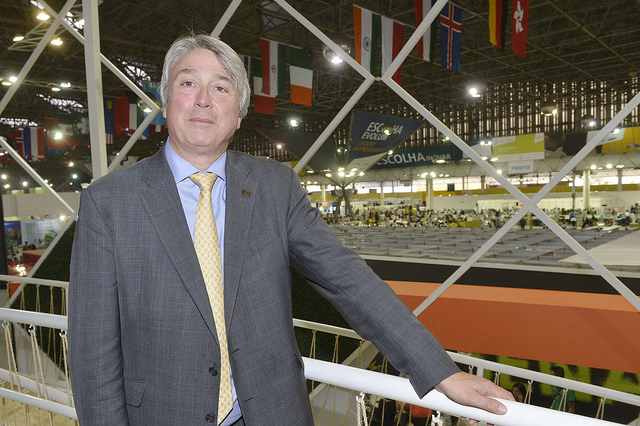Interview with Simon Bartley, President of WorldSkills
18 August 2015

Competition Organizer WSSP2015: How would you evaluate WorldSkills São Paulo 2015?
Simon Bartley: I´m enjoying it, and the reason is because the Competitors are able to compete in the best possible facilities that they could have. I believe our most important people are the Competitors, and allowing them to demonstrate their abilities to themselves and to the world is the most important thing. If they are happy; then, I am happy. We had a marvellous Opening Ceremony, and the Competitors loved it. The Competition areas are absolutely tremendous, and Competitors are competing well. The Competition is coming to an end now, and we have a Closing Ceremony to do. It has been super.
Competition Organizer WSSP2015: What is your overall opinion about the Competition this year?
SB: As well as being bigger and having more skills, with more Experts and more floor space, I think the thing that really impresses me is that from what I´ve seen, the quality of what we expect Competitors to do, and the way they are striving to achieve it, is higher than ever before. And if increased excellence is our main requirement in this Competition, then we´ve achieved it.
Competition Organizer WSSP2015: What caught your attention most?
SB: Of all the other interviews I´ve done that’s the first time I´ve been asked that question. Can I offer two or three answers? I thought at the Opening Ceremony, the engagement of the young people as well as marching in behind their flags, in uniform and formation - all that caught my attention. It engaged the Competitors, and helped them form a bond with the audience.
The regional music and dancing of Brazil brought Brazil to life. Most of us around the world know Brazil for one or two things - obviously for the Amazon rainforest and the city of Rio. I think that the Opening Ceremony gave us a much bigger understanding of the size, the difference, and diversity of Brazil. If you look at what the differences in Europe for example, from Scandinavia down to the Mediterranean, we think that’s natural difference. Here, we are in a single country, and it’s so different from one region to another; I think this is the second thing that caught my eye.
The third one is the space that has been allocated to the Competition. Some areas of the Competition are almost as big as a football pitch. The layout, the space, the ability for people to walk around the outside is always great.
Fourth is the exuberance and the excitement of the young children who are visiting - the engagement with the Knowledge Spots, the looking over and seeing what’s happening, the chat between them. My first WorldSkills Competition was 1989, in Birmingham, in the United Kingdom, and my ever-lasting memory of that was when you walked in, the level of noise was overwhelming. It is even higher here than it was there and then, and I think that has struck me as well.
I think the fifth, let me call it the final one point: I think the fact that we are beginning to catch the attention of the world media is something that I am particularly happy about. You know, we have the BBC here, national television from Korea and Japan, China, India, all of them, including Brazil, of course.
And one more - I think Ministers and NGOs visiting the WorldSkills Conference Programme and the Competition is fabulous. We had our Ministers Conference on Friday 14 August. We’ve always had Ministers visit, but for Conferences, I think it’s really positive. NGOs we’ve had UNESCO, ILO, World Bank, UNIDO, and others - all of these coming because they now understand the importance of skills in the world and our world economy and for changing the world, and that I’ve been also struck by.
Competition Organizer WSSP2015: What do you believe is the legacy that this Competition will provide to São Paulo and Brazil?
SB: I’ve seen the plans for the legacy, and the legacy has already started. All of these visiting students, their parents, and their teachers, get back to their schools, their families, their communities, their businesses; they will talk about WorldSkills São Paulo 2015 for years and years to come. I think the government of Brazil, the government of São Paulo region, of São Paulo state, São Paulo city, and other states that have come here will look at this and say Brazil is brilliant at organizing great events of a non-sportive nature.
You’ve had the World Cup; you will have the Olympics; and I have no doubt they will be successful. But this is not a sports event, this is different, and I think your regional and state competitions, and national, and the WorldSkills America Competition will be better as part of the legacy of what has happened here. I hope that more young bright people will actually end up going into a vocational, technical, or skilled education than ever before, and, therefore, the economy will be better, employers will have more resources to be able to hire. I think there will be a great legacy, as it has been in other host countries going forward. It will be interesting to see whether we can come to some statistics, like Finland in 2005, about the number of people who pursued skilled education or are going to vocational education as a result of their being a part of the Competition.
Competition Organizer WSSP2015: What message do you want to give all of the young Competitors of WorldSkills São Paulo 2015?
SB: The message to the Competitors would be a mirror of what I said at the Opening Ceremony. Let me do it in a different order. I would say to them that when they get home to their homes, I hope they look back and regard what they have done here as, firstly, enjoyable; secondly as something that has built them as individuals; thirdly, as having improved their technical ability, so that they can go out into their careers at a better level and a higher level than before. They are all Champions, and I wish every one of them great success in their careers. I would ask them to continue spreading the message through their younger brothers and sisters, through their parents, through their schools, that vocational, technical, and skilled education is an absolutely valid progression route and career for everyone - however smart, however capable with their hands they are. Vocational skills can be for everyone.
Related News
Press Team
Brazil press contacts
Karina Brandford: +55(11) 7850-8269 / ID. 80*848
Marina Figueira: +55(11) 7741-0991 / ID. 80*180636
Lívia Nolla: +55(11) 7850-7232 / ID. 80*1148
Gustavo Silva: +55(11) 7850-8948 / ID. 80*1065
Email: imprensa.ws@wssp2015.com
International press contact
Laura London, Communications Manager, WorldSkills International
Email: press@worldskills.org
Answers to frequently asked questions:
